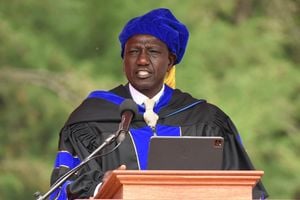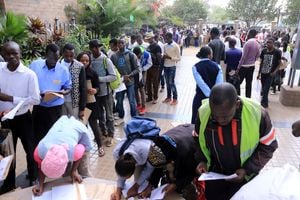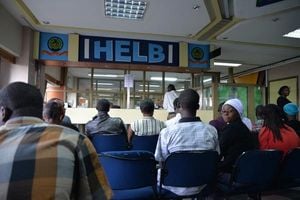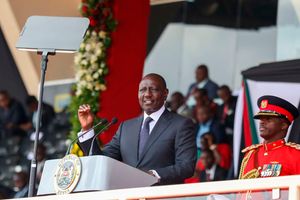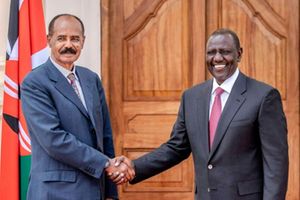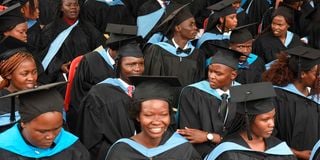
Graduands during the 42nd University of Eastern Africa Baraton graduation ceremony in Nandi County on August 18, 2024.
When Suheil Mkalla Mumba scored a mean grade of A- (minus) in the 2023 Kenya Certificate of Secondary Education (KCSE) examinations, he was overjoyed.
Although he had expected to score a straight A, nevertheless, he was content with the grade that enabled him to qualify for university admission as that would open up opportunities for him in the future to uplift his family.
The Kenya Universities and Colleges Central Placement Service (Kuccps) placed the 2023 top student at Kwale Boys High School at Egerton University in Nakuru County to study medicine and surgery.
Many other students would be overjoyed by such prospects, but for Mumba, there is a problem. The hope for him to pursue his dream career is turning into a nightmare.
After applying for government funding through the new model introduced last year, he was categorised in Band 5, which comprises students who receive the least support.
The total cost of the programme is Sh490,940 per year, and since Mumba is in Band 5, he is now expected to pay Sh257,000 per year or Sh128,500 in tuition fees.
Menial jobs
“I do not know what will happen. My parents do menial jobs. I don’t know what the future holds for me,” said Mumba.
Students categorised in Band 5 are from families with an income of Sh120,000 and above.
The funding model splits university fees into government scholarships which are awarded by the Universities Fund (UF), tuition and upkeep loans offered by the Higher Education Loans Board (Helb). The amount a student receives (calculated as a percentage) depends on the level of a means testing instrument (MTI) that has received criticism.
Mumba, the first-born in a family of six children, said he remains hopeful that he will get assistance to realise his childhood dream. In the primary school national examinations, he scored 389 marks out of 500 to emerge top in his school, thereafter, the county government sponsored his education in secondary school.
“This misclassification has left my family in a precarious situation, as they now face the daunting task of securing funds to cover my tuition and other university expenses,” he told Nation.
Mumba’s case mirrors that of thousands of other students who complained that Helb and UF have wrongly categorised them, thereby putting university education out of their reach. The students, their families and other stakeholders have complained about the model and are calling for its review.
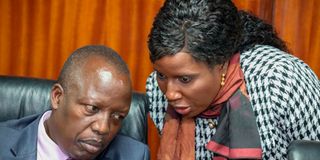
State Department for Higher Education and Research PS Dr Beatrice Inyangala and National Assembly Departmental Committee on Education chairperson Julius Melly when she appeared before the committee on July 18.
According to official data, a total of 113,105 funding applications have been processed. However, only 10,528 of the applicants have been classified in Band 1, who will receive the highest government support, while Band 2 has 11, 393 students. Band 3 has 20,089 students and over half of the students have been placed in Band 4 (37,764) and Band 5 has 26,137. Another 7,194 students are self-sponsored, and they only qualify for the upkeep loan and they do not get a scholarship.
For Julian Kathure, her joy at university admission has been overshadowed by the financial strain that came with it. Kuccps had placed her at Kisii University to study ecotourism and hospitality management.
“I’m aware of my family’s economic situation and job opportunities in that sector so I applied for a transfer to Bachelor of Education,” she told Nation.
Kathure is to report to Taita-Taveta University on Monday next week. The total cost of the programme is Sh183,000, and the higher education funding model has placed her in Band 3. Her family is now expected to raise part of her tuition fees which amounts to Sh36, 720 per year.
University fees
The family is virtually unable to afford her university fees. Her mother has been sickly and bedridden while her father died in 2012. They live on a piece of land that a relative has allowed them to squat on in Kanyekine, Meru County.
“While filling out the application, she listed me as a guardian and it seems Helb and UF used my information to classify her. It’s wrong to do that because I’m a relative, not her parent. They should consider her needy status,” said her relative.
At Omosasa village, Ogembo in Bomachoge Chache Constituency, Kisii County, Harry Omwancha does not know whether he will join his colleagues in class at Masinde Muliro University where he has been placed to pursue a course in computer science.
Omwancha has been placed in Band 4, and his father, Mr Mark Onsongo, says he is unable to pay for his child’s education as he is already overwhelmed with the burden of educating two of his older children who are also in university.
“I was forced to sell a portion of land to take them to school. The only piece of land that was left is what I am relying on to feed my family through subsistence farming,” Mr Onyancha lamented. “I have also been holding fundraisers to an extent that my neighbours are saying that I am bothering them for always asking for a helping hand.”
Veronica Sherly has been admitted to Rongo University to pursue a Bachelor of Education course and she was hoping to receive government funding to relieve her mother of the financial burden, but she has found the going tough.
Emmanuel Omong’oluk from Namanjalala, Kwanza Sub-County in Trans Nzoia County told Nation that he has been placed in Band 2 despite his parents being casual labourers. He is expected to join Moi University on August 26 to undertake a Bachelor of Education (Arts) degree.
Gabriel Junior Wamalwa, 19, has been admitted to Kisii University for a Bachelor of Education (Arts) degree. His father told Nation that his monthly earnings are slightly above Sh20,000, but his son has been placed at Band 4. He said that he has a daughter at the Kenya Medical Training College, a son in Form 1 and another in junior school.
“In Band 4, I will be forced to pay Sh42,000 per semester,” he said.
Joshua Kemei, from Chepokoiyo Village in Cherangany has been admitted to Jomo Kenyatta University of Agriculture and Technology where he is to pursue a bachelor's degree in Geomatic Engineering and Geospatial Information Systems.
His parents do odd jobs in the village to earn a living yet he has been placed in Band 2.
“I’m confused. I’m trying to raise money for a suitcase and shoes for my journey to Nairobi. My parents are very poor. At home, we have only one meal in a day,” Kemei said during an interview with Nation.
Shadrack Kisheunet from Muono in West Pokot County is supposed to join Bomet University College this week. He has been placed in Band 4, yet he has a Sh60,000 fee arrears at his former secondary school.
“I was unable to pay the fees but my principal excused me and allowed me to pay later,” he said.
Reporting by David Muchunguh, Mercy Koskei, Siago Cece, Oscar Kakai, Evans Jaola , Victor Raballa and Wycliffe Nyaberi.

